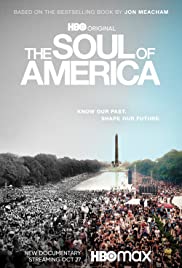
THE SOUL OF AMERICA
US, 2020, 80 minutes, Colour.
Directed by K.D.Davison.
This is an excellent American documentary. It was released in 2020, seen widely at the time of the US presidential election campaigns. It offers an opportunity to listen to the ideas of an eminent American journalist, formerly editor of Newsweek, Jon Meacham. He had published his book, The Soul of America – at the Battle for our Better Angels. And this documentary dramatises not just his opinions but he episodes in American history that he sees as keynote challenges, challenges for change.
Directed by K.D.Davison (Katie Davison), the structure of the documentary is exemplary. It is personalised initially by seeing Meacham at his home, getting ready to go on lecture tours, a pleasant introduction to him as a person ready to listen to his opinions). Throughout the film we see him at studios being interviewed, at universities and other institutions giving lectures, some encounters with the audience afterwards. He is talking head that we are interested in – and, probably, like.
There is a summary of his historical background, early years as a journalist in Chattanooga, his moving to Newsweek, becoming Editor in Chief, his books and writing. A Republican supporter at the time of Ronald Reagan’s election in 1981, an observer of the American ethos in the four decades which follow, some implicit criticisms of Donald Trump and his presidency rather than an attack on him.
The Soul of America capitalises on the advantages of images, moving images, historical footage, to give more reality and meaning to the words and commentary. Several episodes in American history have singled out, well illustrated by the footage of the times, with some expert and personal comment from witnesses. They range from the suffragist movement in the United States, the leaders, the demonstrations, the hostility, the role of Woodrow Wilson to contemporary American life and the frightening statistic that in the 1960s, popular support for government leadership was 77% while the contemporary statistic is a mere 17%.
The film shows the aftermath of the depression, result and his vision, his collaboration with interested parties, his handling of the transition from neutrality in World War II to the post Pearl Harbor declaration of war. One of the very interesting episodes dramatised, with quite a lot of footage which elicits audience compassion and grief is the internment of the Japanese Americans during World War II (something which the Liberal Roosevelt ordered). The witnesses about their experience include the Star Trek activist, George Takei.
The Kennedy years, brief as they were, illustrate Meacham’s points, Eisenhower advising John F. Kennedy, after the Bay of Pigs, to do consultation before making decisions, seen with the 13 Days and the missiles of October. There is also the Civil Rights legislation, Lyndon Johnson’s decision to follow through, collaboration with Martin Luther King, the defiance taunts slavery turned into segregation in the South, and many alarming pictures from the 1920s to the 1960s Ku Klux Klan members marching, even along Pennsylvania Avenue.
An interesting illustration is, surprisingly, from George H.Bush, not rushing to the Berlin wall as people thought he should, but, rather, giving Gorbachev and Glasnost some space so that the two could sign agreements after the collapse of the Soviet Union.
Meacham makes us realise that the 21st-century present situation has had many parallels in the past, some even worse than the present divisiveness in the United States. So, this is an intriguing, interesting and challenging documentary. And Meacham quotes Mark Twain stating that history does not necessarily repeated itself – but it rhymes!